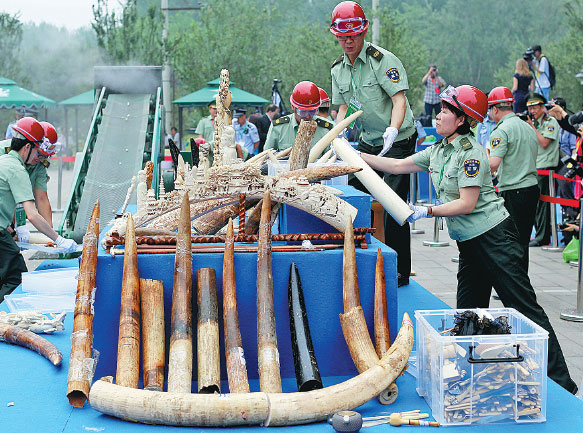Crushing ivory signals action to protect wildlife
The country is to step up its efforts to combat the illegal trade in endangered species and wildlife products, a minister said on Friday as he witnessed the destruction of 662 kilograms of confiscated ivory in Beijing.
The ivory was crushed in front of diplomats and reporters at the Beijing Wildlife Rescue and Rehabilitation Center in Shunyi district as a demonstration of the stance the country is taking against the trade, the State Forestry Administration said.
Engraved tusks and carved ivory artworks were fed into a large crushing machine that sent clouds of dust and powder into the air.
|
Law enforcement officers destroy confiscated tusks and ivory artworks at the Beijing Wildlife Rescue and Rehabilitation Center on Friday. Wang Jing / China Daily |
The ivory was smuggled from Africa either by travelers who carried it in their luggage or through the mail service.
"This event has demonstrated the Chinese government's firm resolution to protect the environment, conserve wildlife and combat the illegal trade in wildlife and wildlife products, including ivory," said Zhao Shucong, the minister in charge of the administration.
He said stricter measures will be taken to prevent illegal movements of wildlife and products made from it by transportation, post and express delivery companies.
The authorities will combat illegal online trading in ivory by monitoring websites and examining the bank accounts of those involved. Legal ivory processing and trading will continue to be strictly controlled until the commercial manufacture and sale of ivory products is eventually halted, he said.
Yan Xun, a senior official at the forestry administration's Wildlife Protection Department, said 34 manufacturing companies have been granted licenses to import ivory and ivory products.
Across the country, 200 sales outlets have received approval from the administration to sell ivory and carved products. The processing companies make carved products and handle an estimated five metric tons of ivory among them each year, he said.
China announced a one-year ban on imports of carved ivory products in February.
Demand for ivory and carved artworks has soared among collectors in China in recent years. People here work with gangs in Africa to smuggle in ivory and sell it on the black market, according to the General Administration of Customs.
The administration says its officers investigated 282 cases involving the smuggling of ivory and products made from it from 2012 to last year and arrested 458 suspects. There have been 39 cases and 39 arrests so far this year.
In a typical case in September, customs officers in Shanghai confiscated 10 pieces of ivory and 345 ivory products, including necklaces and chopsticks, from two Chinese suspects. The items were valued at 6 million yuan ($970,000).
The suspects flew to Shanghai from Ethiopia and were detained as they passed through customs checks.
Yu Guangzhou, director of the customs administration, said the country has taken a series of measures to combat ivory smuggling. New laws were introduced, and a number of special operations have been staged to curb the illegal hunting of wildlife and trafficking.
John E. Scanlon, secretary general of the Convention on International Trade in Endangered Species, said, "This action reflects China's resolution to curb illegal trading of ivory."
In 2013, China-a signatory of CITES - was identified as one of eight nations failing to do enough to tackle the illegal ivory trade.
zhangyan1@chinadaily.com.cn



















